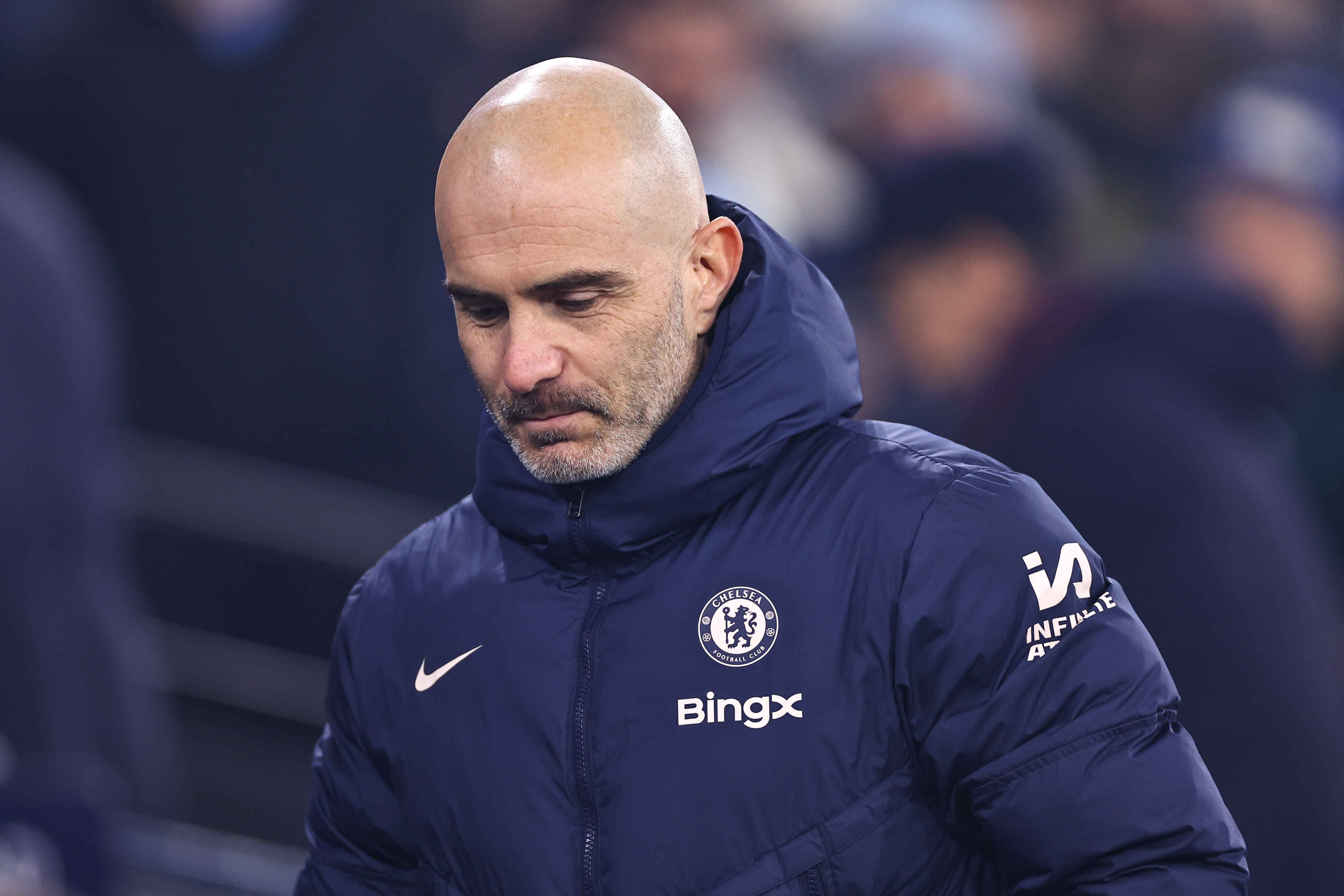The 50 Best Football Books Ever: 30-21
Fear, beauty, speed, miracles, glory and... "LSD soccer"?!
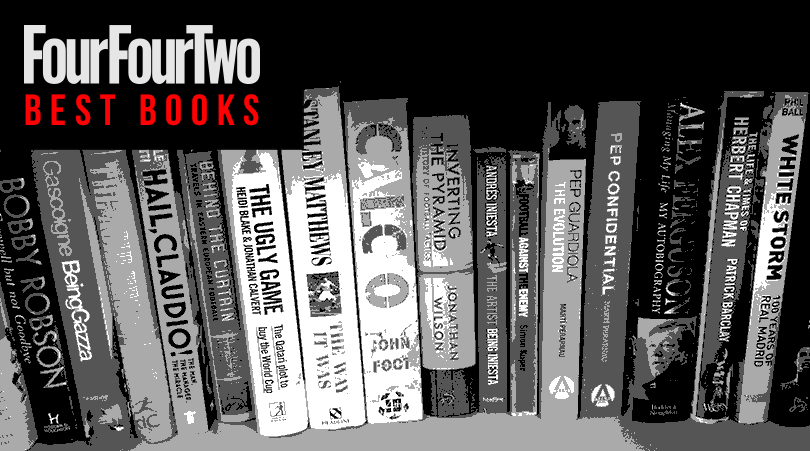
As we slide into the top 30, it's time for bed-wetting, Benedict Cumberbatch, LSD soccer, Dick Whittington and Triumph Stags...
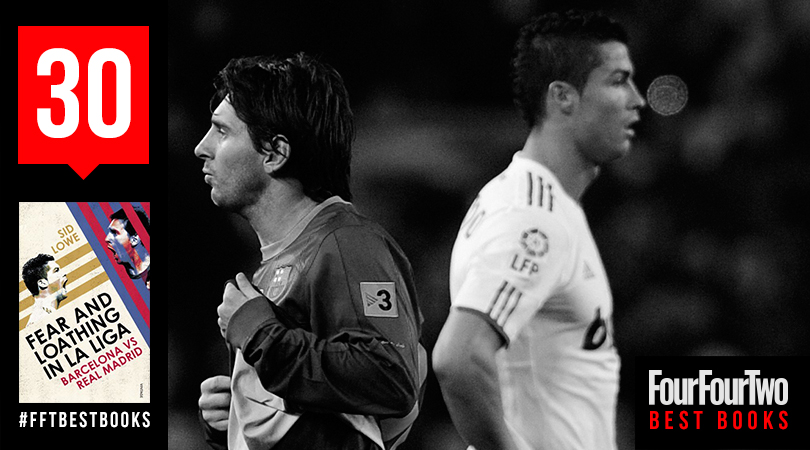
30. Fear and Loathing in La Liga
Barcelona vs Real Madrid – Sid Lowe, 2013
Are you sitting comfortably? Good. Because you simply can’t read a proper book about Barcelona vs Real Madrid without a lengthy history lesson that digs up the roots of world football’s biggest fixture.
You might find it hard going at first, but stick with it: there’s so much to be fascinated by in each club’s humble beginnings; of General Franco and the Catalan resistance; of Madrid’s mercurial Alfredo Di Stefano; of Barça’s brilliant László Kubala and his escape from Hungary dressed as a Russian soldier; of how each club swiped those last two players from under the others’ noses in similarly grubby circumstances.
As Lowe digs deeper you’ll find valuable interviews with legendary representatives on either side of the divide – see Di Stefano, Johan Cruyff, Zinedine Zidane, Hristo Stoichkov and Raul to name but a few. Yet these are all just characters in a much greater story, one in which each side has grown to despise and yet need the other to further validate its ideals; Barcelona the club of Catalonian pride, Real Madrid the glitzy, powerful galactico-collectors with a record 11 European Cups to their name. It’s the globe’s greatest game for a reason, and this brilliantly researched book explains how. Joe Brewin
–––––––––––––––––––
Get FourFourTwo Newsletter
The best features, fun and footballing quizzes, straight to your inbox every week.
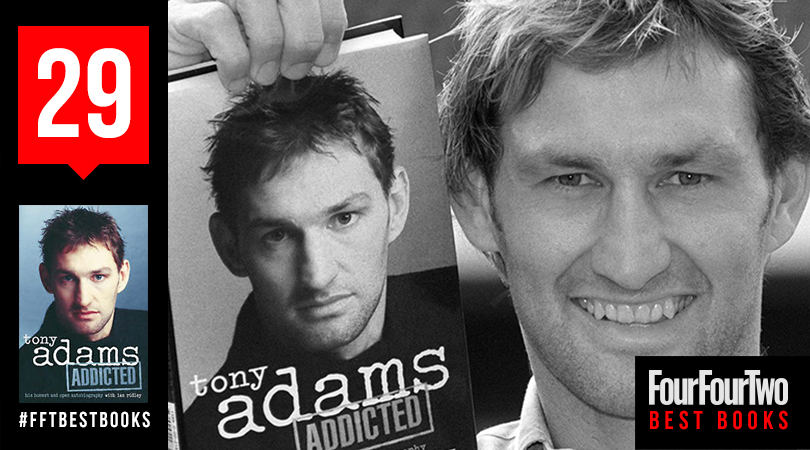
29. Addicted
Tony Adams with Ian Ridley, 1998
“For an autobiography to work,” explains writer Eamon Dunphy, “the subject has to be willing to discuss his faults. The footballer must show himself to be real and flawed.” Addicted was the first such autobiography. Adams talks with breathtaking honesty about the two addictions which have dominated his life – football and alcohol.
His career encompassed both the “win or lose, we're on the booze” culture of the ’80s and the mineral water/steamed broccoli of Arsene’s Arsenal. His harrowing account of his descent into alcoholism (including bed-wetting and clothes-soiling) drew criticism from those with weaker constitutions. The majority were simply dumbfounded by what they read, and concurred with Wenger’s comment: “Tony, I’m amazed you’re still actually with us.” Jon Spurling
–––––––––––––––––––
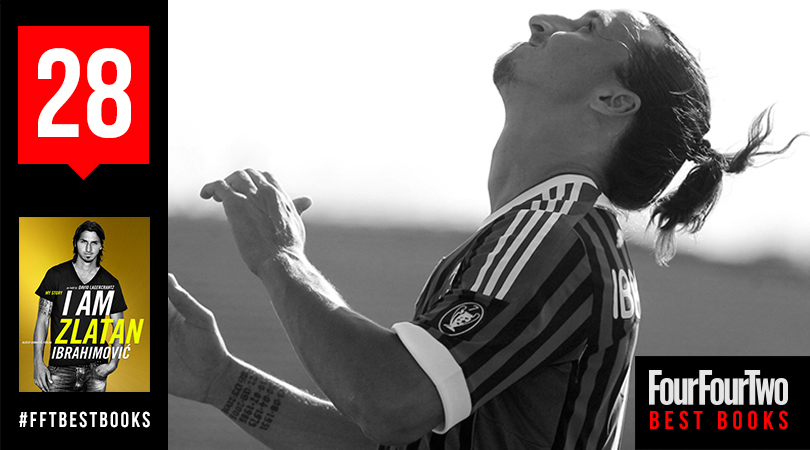
28. I Am Zlatan Ibrahimovic
Zlatan Ibrahimovic, 2013
Modern footballer autobiographies follow a pretty standard shtick. Player outlines tough childhood (ideally where ball is only friend), player gets picked up, player nearly gets cut, player works hard, player gets success, player lightly coats off rival without revealing too much.
I Am Zlatan Ibrahimovic is different. The Manchester United striker revels in his role as pantomime anti-hero, but goes deeper than mere Marmite pastiche. The searing honesty of how his relationship with Pep Guardiola disintegrated at Barcelona – which notably details how fragile that seemingly unshakable ego can actually be – is refreshing, as is how an unforgiving upbringing spending time between an overworked cleaner mother and indifferent alcoholic father shaped everything that followed.
Yes, author David Lagercrantz has since admitted he has embellished much of the content, but don’t let that detract from what is a fabulous book. Think of I Am Zlatan Ibrahimovic as a movie biopic based on someone’s life – Colin Firth in The King’s Speech, Joaquin Phoenix as Johnny Cash in Walk The Line or Benedict Cumberbatch’s star turn as maths genius Alan Turing in The Imitation Game. It might not be historically accurate, but it captures the essence of the person better than any straight biography could ever wish. Andy Murray
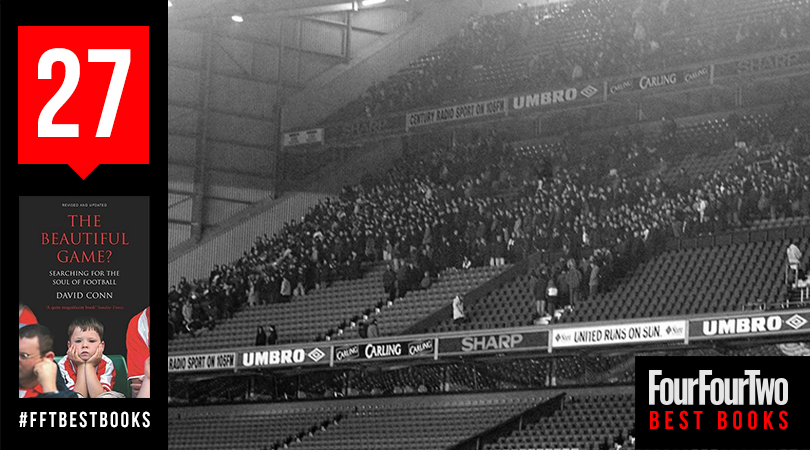
27. The Beautiful Game?
Searching For The Soul Of Football – David Conn, 2004
The lament for football’s lost golden age and the belief that commercial interests have sullied the game are nothing new – Willy Meisl’s 1960 book Soccer Revolution argues that the liberalisation of the offside law in 1925, which played to the popular demand for more goals, was the beginning of the end. However, Conn’s 2004 book is a heartfelt account of the increasingly rapid changes of the previous couple of decades. “It is deeply frustrating,” he writes, “seeing the national game revel in a boom, which could take it so far, yet drive itself so needlessly into dysfunction and failure.”
Conn is no nostalgic who believes the ’80s were a golden period – to him Wimbledon’s FA Cup triumph in 1988 was not so much a wonderful fairy tale as a victory for thuggery – but he is appalled by the descent of the game into rampant, barely regulated commercialism. “I think the end of the sharing of gate receipts in 1983 was the first break,” he says.
“When I talk about the soul, I mean the part of football that is more than business,” he continues. “The soul is the passion and the loyalty of fans, but it is also the joy to be found in playing the game. As other collective institutions disappear, football clubs are becoming an increasingly central part of people’s identity, and that’s why we see these heroic struggles to save clubs when they are threatened.”
Books on the business of football can be unreadably dry, but The Beautiful Game? is passionate and bleakly humorous. Quite aside from the depth of the research, what sets Conn’s book above Tom Bower’s Broken Dreams, a mystifying winner of the William Hill’s Sports Book of the Year Award in 2003, is the sense that he really cares. Broken Dreams was riddled with errors, both of fact and of spirit; Conn, simply by noting, for instance, that fans know intuitively why Notts County matter, taps into a depth of tradition of which Bower has no grasp. Bower just says football is in a very bad way; Conn tells us why it is worth putting right. Jonathan Wilson
–––––––––––––––––––
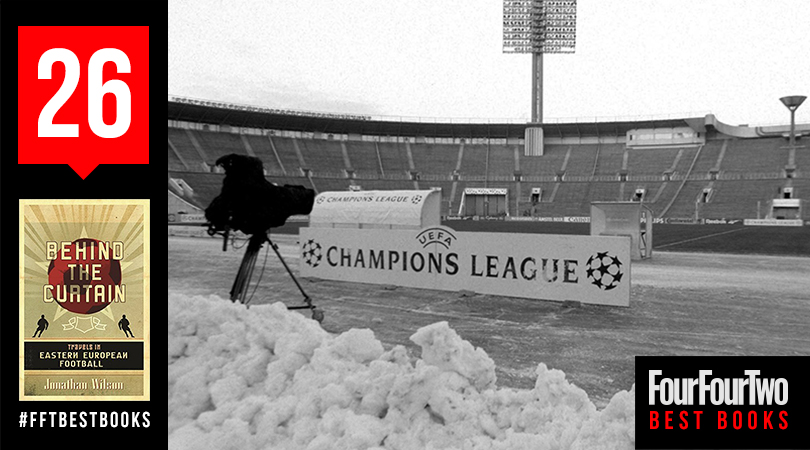
26. Behind The Curtain
Travels In Football In Eastern Europe – Jonathan Wilson, 2006
Before his more famous tactical opus Inverting the Pyramid, Wilson’s first book offered a fascinating peek behind the Iron Curtain into Eastern Europe. Dedicating a chapter per country, or former super-state in the case of former Yugoslav states, Behind the Curtain shows just how influential politics has been on football in Europe’s outposts. From dictatorial influence in Romania with Nicola Ceausescu to the disintegration of Yugoslavia and descent into genocidal civil war, there are stories aplenty.
Much of the talk of great teams from Dynamo Moscow to Dynamo Kiev and Steaua Bucharest is repeated in Inverting the Pyramid, but it’s the people to whom Wilson speaks for this book that implore the reader to care about teams they may otherwise ignore. Each country, each club, is dealt with great tact.
Now the book is a decade old, you almost wish there were an update, given the breakneck pace at which politics and football move in Easter Europe. Even so, it’s proof that football life exists, and can be very interesting, beyond the big boys. Andy Murray
–––––––––––––––––––
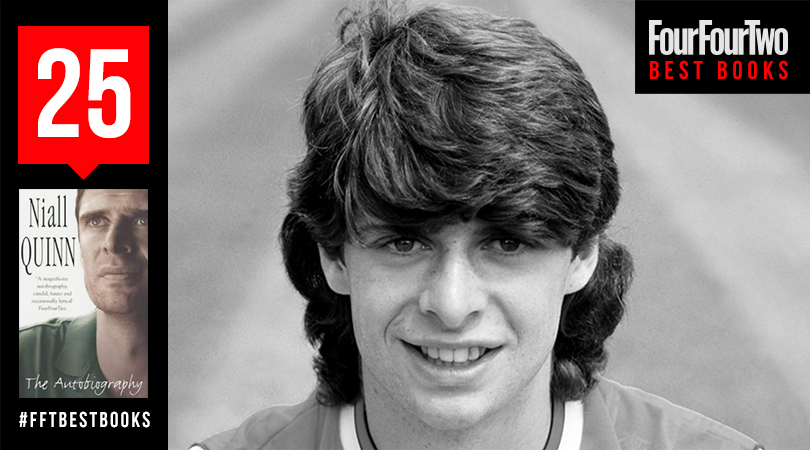
25. Niall Quinn
The Autobiography – Niall Quinn & Tom Humphries, 2002
There’s definitely something about Irish players and their autobiographies. Quinn’s book might not be as controversial as those of some of his compatriots, but it is nonetheless a candid insight into a man generally recognised as one of the nicest in football. More than that, it is a real book, written in a simple, dryly amusing, almost lyrical style that, even if it wasn’t, could have been written by Quinn and yet still qualifies as proper writing.
He was helped by having the 2002 World Cup and the rumpus surrounding Roy Keane’s departure from the squad as a starting point, but by the end that is just one issue among many. Football happens to have been Quinn’s life, but his autobiography is just as much about regret, about moving on and about remaining a decent man in a world that is profoundly indecent. Jonathan Wilson
–––––––––––––––––––
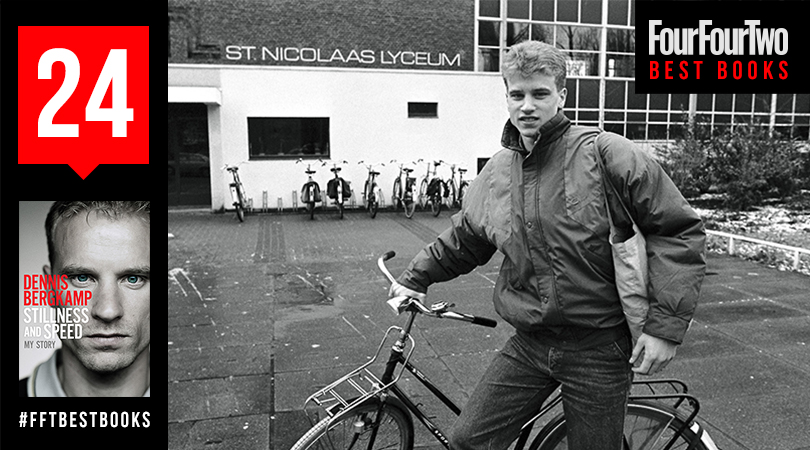
24. Stillness and Speed
My Story – Dennis Bergkamp, 2013
If you’ve read one footballer’s autobiography, you’ve read them all. Like modern-day Dick Whittingtons they all trot out the same tiresome rags-to-riches tale. Yeah, we get it – you were poor, you always had a ball at your feet, you hated school, then you became a superstar blah blah blah.
In the same way his genius produced something out of the ordinary on the pitch, Bergkamp’s book offers an alternative to the birds, booze and fast cars format most players follow. The Dutchman’s love of the game and philosophies on how it should be played pour off the pages, with anecdotes and insight from his time at Ajax, Inter Milan and Arsenal.
Bergkamp delivers his footballing sermon through multiple voices – not just his own. We hear from former team-mates and coaches and co-author David Winner throughout. Stillness and Speed is for football fans, not just impassioned Gooners. Ben Welch
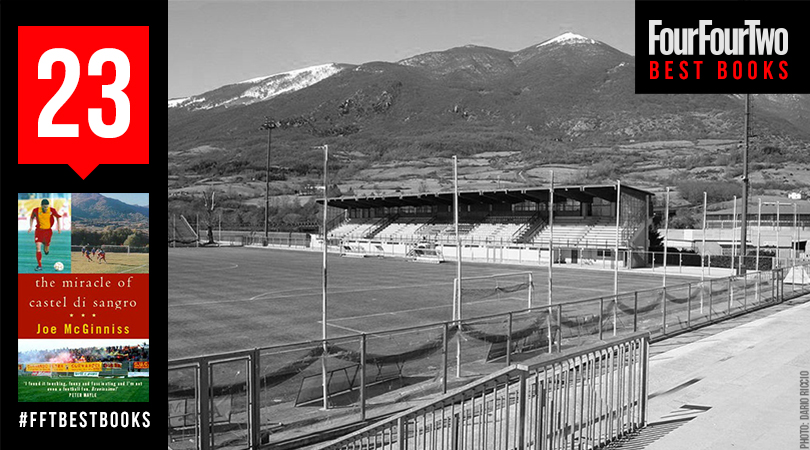
23. The Miracle Of Castel Di Sangro
A Tale Of Passion And Folly In The Heart Of Italy – Joe McGinniss, 1999
This hilarious, compelling, often misunderstood book easily disproved the notion that Americans can’t write about soccer. McGinniss, who made his name writing about US politics and his fortune penning true-crime bestsellers, details the rise of Castel di Sangro, from a town of 5,000 people, to Serie B.
But this is as much The Sopranos as Field of Dreams. A season of joy, tragedy, hilarity and courage draws to a shabby close with the team throwing a game as a player reminds the author: “Remember, we are the land of Dante but also of Machiavelli.”
The comic highlight is the press conference where the club’s new African ‘signing’ from Leicester City announces he’s planning to sleep with all the players’ wives – a deal that proves to be a hoax. Odd as that sounds, it’s not the strangest incident in this book. Paul Simpson
–––––––––––––––––––
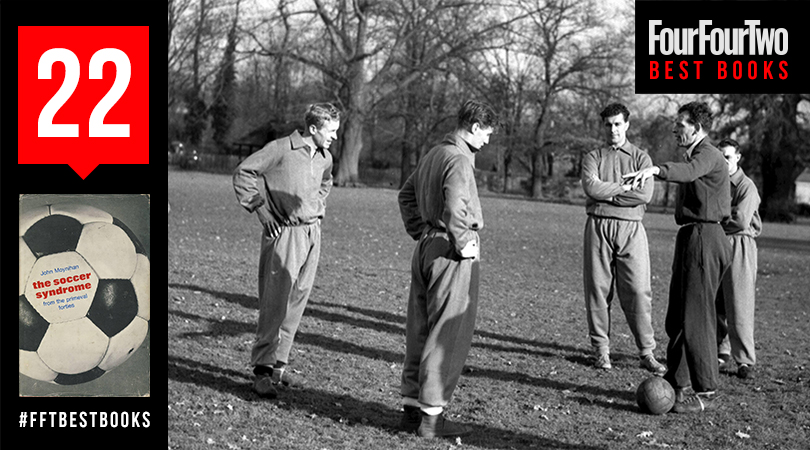
22. The Soccer Syndrome
John Moynihan, 1966
First released four months before the 1966 World Cup, John Moynihan’s The Soccer Syndrome is more a personal ode to post-war football, Brylcreem and all, rather than any kind of assessment of England’s chances at the upcoming tournament. And it’s all the better for it.
Football is at the heart of every chapter here, but witnessed through the prism of the Sunday Telegraph football reporter’s experiences and life journey along the way. From a childhood spent face-down in the dirt at a rugby school – “I stared at the grass below and, as a heel lashed into my nose, I dreamt of the fruits of the outside world, Association Football” – to watching Pele and Garrincha light up the 1958 World Cup Final over a lovelorn female companion’s shoulder in a Paris café, Moynihan’s focus on events and fandom make this come alive.
Yet what sets The Soccer Syndrome apart from most first-person accounts on the beautiful game is how he lifts the mundane football occurrence to something vivid and unique. “We play what might be called LSD soccer,” Moynihan wrote of Sunday League football, of which he was a keen advocate, “a pleasure only for the participants.”
Pure nostalgia it may be, but this book has aged well. Seldom has the beautiful game’s essence been better captured. Andy Murray
–––––––––––––––––––
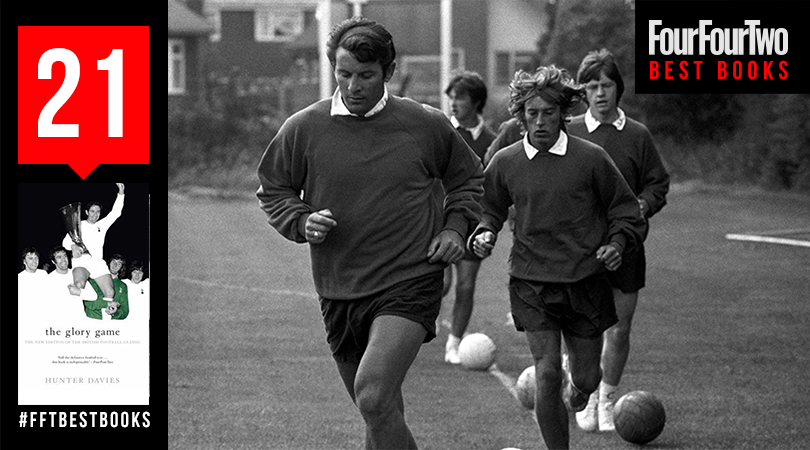
21. The Glory Game
Hunter Davies, 1972
“There is no way that a writer these days could possibly do what I did in The Glory Game,” explains Hunter Davies. “He or she wouldn’t be able to get past the minefield of agents, lawyers and officials.”
In the 1971/72 season, Davies was granted unprecedented access to Tottenham boss Bill Nicholson and his 19-man first-team pool. With no official contract behind him, he admits to “worming my way in” at White Hart Lane, and convincing all those concerned that an “inside story” book charting Spurs’ season would be a worthwhile project.
“I’d originally been told that as a club, Spurs would be completely unapproachable, and that Nicholson would be dour and difficult,” recalled Davies. “He was completely cooperative though, and when I informed the players that I would keep 50% of the royalties and split the other half equally between them, they were happy too. It wasn’t a huge amount of money though!”
The Glory Game defined the fly-on-the-wall sports book. Although Nicholson later claimed that he’d occasionally felt inhibited by Davies’ presence (particularly when chastising Martin Chivers), the Spurs players and staff were remarkably candid in confiding their hopes and fears. Aside from the frequent references to flares, Triumph Stags, and Nicholson’s hatred of men with long hair, Davies’ book simply doesn’t date. “The tensions, the personality clashes, the fear of losing one’s place in the team, the monotony of training, triumph and despair, concern over injuries, old players fading... all these factors will remain constants in team sports for as long as they’re played,” argues Davies.
Printed in five different languages, and a big seller in the USA, The Glory Game is rightly regarded as a classic. And remember that in an era of media-trained stars and Fort Knox-style security at big clubs, there will never be a remake. Jon Spurling
In the next section: Psychosis, neurosis and an obstinate maestro
Gary Parkinson is a freelance writer, editor, trainer, muso, singer, actor and coach. He spent 14 years at FourFourTwo as the Global Digital Editor and continues to regularly contribute to the magazine and website, including major features on Euro 96, Subbuteo, Robert Maxwell and the inside story of Liverpool's 1990 title win. He is also a Bolton Wanderers fan.
